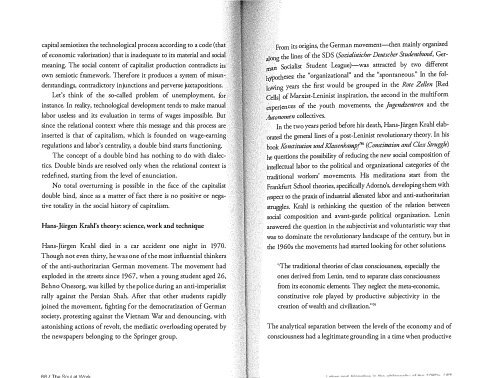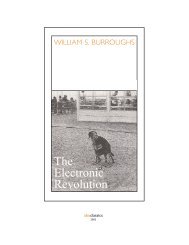Franco ''Bifo'' Berardi - The Soul at Work From Alienation to Autonomy
Franco ''Bifo'' Berardi - The Soul at Work From Alienation to Autonomy
Franco ''Bifo'' Berardi - The Soul at Work From Alienation to Autonomy
You also want an ePaper? Increase the reach of your titles
YUMPU automatically turns print PDFs into web optimized ePapers that Google loves.
capital semiotizes the technological process according <strong>to</strong> a code (th<strong>at</strong><br />
of economic valoriz<strong>at</strong>ion) rh<strong>at</strong> is inadequ<strong>at</strong>e <strong>to</strong> its m<strong>at</strong>erial and social<br />
meaning. <strong>The</strong> social content of capitalist production contradicts its<br />
own semiotic framework. <strong>The</strong>refore it produces a system of misunderstandings,<br />
contradic<strong>to</strong>ry injunctions and perverse juxtapositions.<br />
Let's think of the so-called problem of unemployment, fo r<br />
instance. In realiry, technological development tends <strong>to</strong> make manual<br />
labor useless and its evalu<strong>at</strong>ion in terms of wages impossible. But<br />
since rhe rel<strong>at</strong>ional context where rhis message and rhis process are<br />
inserted is th<strong>at</strong> of capitalism, which is founded on wage-earning<br />
regul<strong>at</strong>ions and labor's centraliry, a double bind starts functioning.<br />
<strong>The</strong> concept of a double bind has nothing <strong>to</strong> do with dialectics.<br />
Double binds are resolved only when the rel<strong>at</strong>ional context is<br />
redefined, starting from the level of enunci<strong>at</strong>ion.<br />
No <strong>to</strong>tal overturning is possible in the face of the capitalist<br />
double bind, since as a m<strong>at</strong>ter of fact there is no positive or neg<strong>at</strong>ive<br />
<strong>to</strong>taliry in the social his<strong>to</strong>ry of capitalism.<br />
Hans-Jiirgen Krahl's theory: science, work and technique<br />
Hans-Jiirgen Krahl died in a car accident one night in 1970.<br />
Though not even thirry, he was one of the most influential thinkers<br />
of the anti-authoritarian German movement. <strong>The</strong> movement had<br />
exploded in the streets since 1967, when a young student aged 26,<br />
Behno Onesorg, was killed by the police during an anti-imperialist<br />
rally against the Persian Shah. After th<strong>at</strong> other students rapidly<br />
jOined the movement, fighting for the democr<strong>at</strong>iz<strong>at</strong>ion of German<br />
sociery, protesting against the Vietnam War and denouncing, with<br />
as<strong>to</strong>nishing acrions of revolt, the medi<strong>at</strong>ic overloading oper<strong>at</strong>ed by<br />
the newspapers belonging <strong>to</strong> the Springer group.<br />
<strong>From</strong> its origins, rhe German movement-rhen mainly organized<br />
along rhe lines of rhe SDS (Sozialisticher Deutscher Studentbund, Germall<br />
Socialisr Student League)-was <strong>at</strong>tracted by two differenr<br />
hyporheses: rhe "organiz<strong>at</strong>ional" and the "spontaneous." In the following<br />
years rhe first would be grouped in the Rote Zellen [Red<br />
Cells] of Marxist-Leninisr inspir<strong>at</strong>ion, the second in the multiform<br />
experiences of the yourh movements, rhe Jugendzentren and the<br />
Au<strong>to</strong>nomen collectives.<br />
In rhe two years period before his de<strong>at</strong>h, Hans-Jurgen Krahl elabor<strong>at</strong>ed<br />
the general lines of a post-Leninist revolutionary rheory. In his<br />
book Konstitution und Klassenkampf" (Constitution and Class Struggle)<br />
he questions rhe possibility of reducing rhe new social composition of<br />
intellectual labor <strong>to</strong> rhe political and organiz<strong>at</strong>ional c<strong>at</strong>egories of rhe<br />
traditional workers' movements. His medit<strong>at</strong>ions start from the<br />
Frankfurt School rheories, specifically Adornds, developing rhem wirh<br />
respect <strong>to</strong> rhe praxis of industrial alien<strong>at</strong>ed labor and anti-aurhoritarian<br />
struggles. Krahl is rethinking rhe question of rhe rel<strong>at</strong>ion between<br />
social composition and avant-garde political organiz<strong>at</strong>ion. Lenin<br />
answered rhe question in the subjectivist and voluntaristic way th<strong>at</strong><br />
was <strong>to</strong> domin<strong>at</strong>e the revolutionary landscape of the century, but in<br />
the 1960s the movements had started looking for other solurions.<br />
"<strong>The</strong> traditional theories of class consciousness, especially the<br />
ones derived from Lenin. tend <strong>to</strong> separ<strong>at</strong>e class consciousness<br />
from its economic elements. <strong>The</strong>y neglect the meta-economic,<br />
constitutive role played by productive subjectivity in the<br />
cre<strong>at</strong>ion of wealth and civiliz<strong>at</strong>ion:'3!<br />
<strong>The</strong> analytical separ<strong>at</strong>ion between the levels of the economy and of<br />
consciousness had a legitim<strong>at</strong>e grounding in a time when productive




